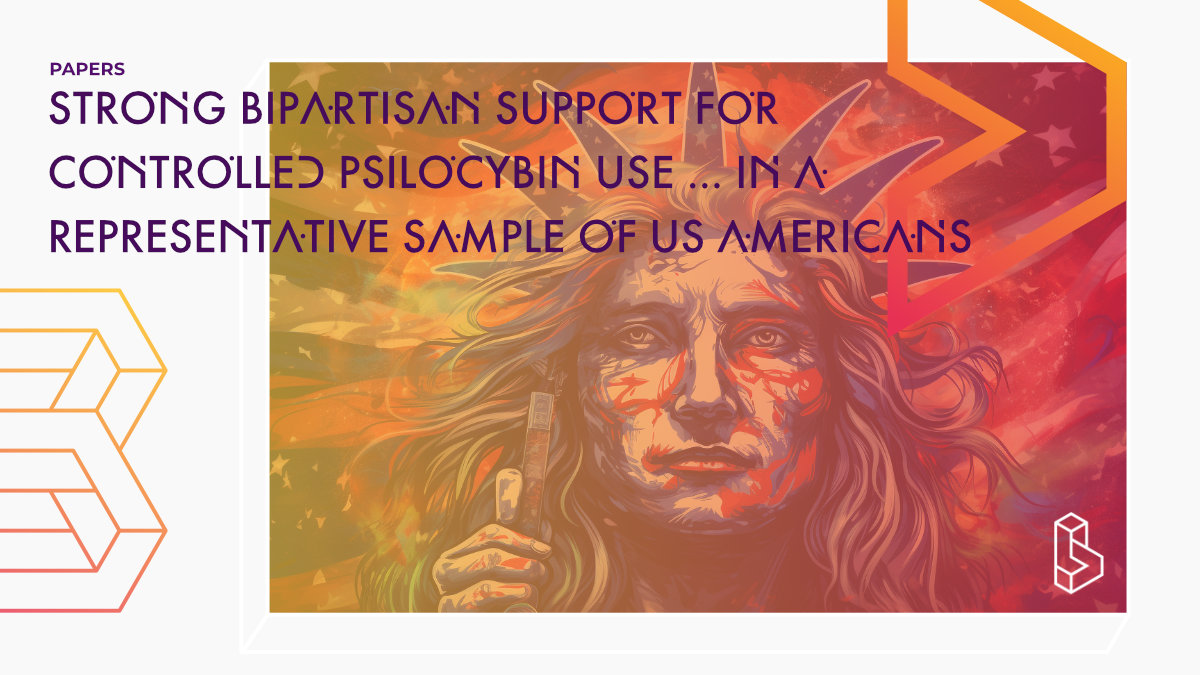This national survey (n=795) in the USA assesses public attitudes towards psilocybin use in licensed settings for psychiatric treatment and well-being enhancement. Participants from across the political spectrum overwhelmingly viewed the individual’s decision as morally positive in both contexts, suggesting strong bipartisan support for supervised psilocybin use.
Abstract of Strong Bipartisan Support for Controlled Psilocybin Use as Treatment or Enhancement in a Representative Sample of US Americans
“The psychedelic psilocybin has shown promise both as treatment for psychiatric conditions and as a means of improving well-being in healthy individuals. In some jurisdictions (e.g., Oregon, USA), psilocybin use for both purposes is or will soon be allowed and yet, public attitudes toward this shift are understudied. We asked a nationally representative sample of 795 US Americans to evaluate the moral status of psilocybin use in an appropriately licensed setting for either treatment of a psychiatric condition or well-being enhancement. Showing strong bipartisan support, participants rated the individual’s decision as morally positive in both contexts. These results can inform effective policy-making decisions around supervised psilocybin use, given robust public attitudes as elicited in the context of an innovative regulatory model. We did not explore attitudes to psilocybin use in unsupervised or non-licensed community or social settings.”
Authors: Julian D. Sandbrink, Kyle Johnson, Maureen Gill, David Bryce Yaden, Julian Savulescu, Ivar R. Hannikainen & Brian D. Earp
Summary of Strong Bipartisan Support for Controlled Psilocybin Use as Treatment or Enhancement in a Representative Sample of US Americans
Psilocybin, a naturally occurring psychedelic found in certain species of mushroom, has been found to be efficacious in treating a variety of psychiatric conditions including major depressive disorder.
Psilocybin has positive neuropsychological effects in healthy participants and patients, including increased prosocial attitudes, mindfulness, and improved overall psychosocial functioning. However, psilocybin use should be appropriately controlled and guided to avoid psychological adverse reactions and long-term harms.
While federally prohibited, the FDA recently granted psilocybin “breakthrough therapy status” for use in MDD and treatment-resistant depression, facilitating clinical research. The state of Oregon has moreover decriminalized psilocybin and legalized it for supervised consumption in licensed facilities.
Find this paper
https://www.psy.ox.ac.uk/publications/1570263
Open Access | Google Scholar | Backup | 🕊
Cite this paper (APA)
Sandbrink, J. D., Johnson, K., Gill, M., Yaden, D., Savulescu, J., Hannikainen, I., & Earp, B. D. (2023). Strong bipartisan support for controlled psilocybin use as treatment or enhancement in a representative sample of US Americans: need for caution in public policy persists. AJOB Neuroscience.
Study details
Compounds studied
Psilocybin
Topics studied
Population Surveys
Study characteristics
Survey
Participants
795
Humans

